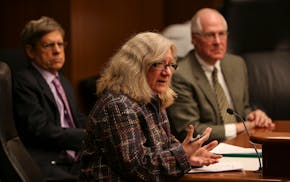Opinion editor's note: Strib Voices publishes a mix of commentary online and in print each day. To contribute, click here.
•••
President Donald Trump fortunately didn't include northeast Minnesota's risky Twin Metals copper-nickel mine on a recent executive order aiming to fast-track projects like this.
But any sigh of relief about that by Boundary Waters Canoe Area Wilderness (BWCAW) advocates came to a quick end this week as Minnesota U.S. House Rep. Pete Stauber and his GOP colleagues took another reckless run at resurrecting this controversial mining project.
The Twin Metals project would not only be located within the BWCAW watershed, but the underground mine and its aboveground operations would also be perched near the shoreline of a lake that is upstream of the beloved, interconnected watery wilderness. Any pollution from an industry already notorious for its abysmal environmental track record could flow downstream into the BWCAW's fragile waters.
In 2023, the Biden administration took a historic step to protect the BWCAW from this project's potential pollution, enacting a policy that is effectively a 20-year moratorium on copper-nickel mining in the watershed. In 2024, a Stauber bill aiming to overturn those protections cleared the Republican-controlled House, but thankfully never gained traction in the U.S. Senate. It expired with the end of the last Congressional session.
Regrettably, Stauber is at it again, cavalierly casting aside the science documenting this type of mining's troubling threat to this protected place. His bill targeting vital BWCAW protections has new life and an expedited path toward enactment, with key provisions now known as Section 80131 of the House Natural Resources Committee's budget reconciliation bill.
Congressional Republicans, who control the House and U.S. Senate, are using the reconciliation process, a budget tool, to enact much of Trump's agenda through large spending and revenue legislation. Reconciliation's key advantage: The legislation can clear the Senate with a simple majority vs. a filibuster-proof 60 votes. Right now, Republicans have 53 seats in the upper chamber.
Unlike the nebulous effect of Trump's pro-mining order, the Stauber measure could be enacted in a matter of months, effectively bulldozing the path forward for Twin Metals to mine on the BWCAW's doorstep. The legislation, including Stauber's sweetheart deal for Antofagasta, the Chilean mining conglomerate that controls Twin Metals, passed out of the committee "shortly before midnight on Tuesday," the Minnesota Star Tribune reported. That advancement is key step forward.
"I know this fight has been long, but we are in the most precarious position for the Boundary Waters that we've ever been in‚" said Ingrid Lyons, executive director of the Ely-based Save the Boundary Waters advocacy organization.
I reached out to Stauber's office for comment but received no response. He spoke briefly at the Natural Resources Committee markup meeting this week, saying "We're going to be responsibly unleashing America's natural resources, which will generate equitable returns for the American people through royalty, rental and auction fees that are bound for the U.S. Treasury."
One estimate of the overall amount that could be raised by the bill checking off items on the oil, gas and mining industry's wish list: $18 billion.
The Stauber initiative's nondescript Section 80131 nomenclature camouflages the damage it could do and who stands to benefit. A more accurate name for Stauber's initiative: The Chilean Billionaires Bailout Act.
As noted above, Chilean-based Antofagasta controls Twin Metals. The wealthy Luksic family, South America's wealthiest clan, controls Antofagasta. Minnesotans ought to be clear about who really benefits from Stauber gutting BWCAW protections.
Lyons, of Save the Boundary Waters, argues that the current Stauber initiative bends over backward even more to assist Antofagasta's wealthy owners than his 2024 bill.
Section 80131 rescinds the moratorium, according to Lyons' organization, but doesn't stop there. It "reinstates under highly favorable terms previously invalidated mineral leases, including perpetual rights of renewal and orders issuance of additional mineral leases to prospecting permit holders with no public process or environmental review."
In addition, it "overrides the Forest Service's statutory right to deny consent to mineral leases" in national forests in Minnesota and "prohibits judicial review except for lessees."
It's disappointing to see Stauber kowtowing to Antofagasta's billionaires. I've previously lauded his work on the Great Lakes Restoration Initiative, which has played a vital role in cleaning up decades of legacy pollution on Duluth's Lake Superior shore. It's a shame Stauber's passion doesn't include protecting the BWCAW, which is also in his district.
The Stauber measure faces an uphill battle in the Senate, where there may be narrower rules on including policy measures like this in reconciliation legislation. It will also face significant pushback led by Minnesota U.S. Sen. Tina Smith. Smith, a Democrat, has commendably introduced a bill to make the 20-year mining protections permanent in the BWCAW watershed.
"Republicans in Congress are trying to give a foreign conglomerate full permission to build a copper-nickel sulfide mine right on the doorstep of the Boundary Waters watershed and irreversibly pollute this pristine wilderness," Smith said.
"By including this language in their big budget bill, they have made it clear they don't care about the science or the data, which shows unequivocally that this type of mining poses an unacceptable risk. I'm prepared to fight with every tool at my disposal to stop this effort and to protect the Boundary Waters for future generations."
It's worth noting that striking a more sensible compromise on copper mining, such as supporting it in less environmentally sensitive areas in Minnesota, could have political upside for Stauber. He only lost three counties in his Congressional district in the 2024 election. The three counties are where those closest to the Twin Metals mine reside: Lake, St. Louis and Cook counties.
Given those election results, he's out of touch with those who live closest to the BWCAW. Finding responsible middle ground on copper mining could hew more closely to constituents' values than he currently surmises.

Fierce but compassionate mental health advocate will be missed
Burcum: 'Big Beautiful Bill' takes hatchet to health care
Burcum: 'Why would we make it harder to get help' for addiction?
!["Republicans want to overturn this newfound eligibility [for undocumented immigrants to enroll in MinnesotaCare], which was passed by DFL majorities i](https://arc.stimg.co/startribunemedia/XZLGO62KH5G6DHR55ER5IECZAY.jpg?h=91&w=145&fit=crop&bg=999&crop=faces)

